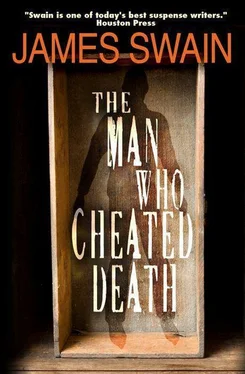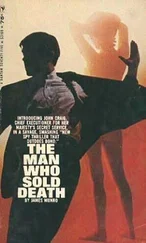“I’m sorry to hear that. Would you like me to help you fix it?”
“Nothing would make me happier,” Osbourne said.
“Good. Now listen carefully. I’ve been thinking about this situation since our visit. I think I know how we can fix this, once and for all.”
Osbourne smiled into the receiver. D.B. had guided him throughout his killing spree, and had come up with creative solutions to solving his dilemmas. He couldn’t wait to hear how his mentor planned to get rid of Hardare.
“I’m listening,” Osbourne said.
Hanging upside down by his ankles, Hardare struggled with the canvas straitjacket holding him prisoner when Jan came up from behind and gave him a push.
“Hey!” he protested, his body swinging like a pendulum.
“You’re going to be outside,” she said. “Are you ready if a stiff wind starts blowing you around?”
No, he wasn’t, and in discomfort he managed to free his left arm, and untied the leather straps holding him prisoner.
“Two minute, fifteen seconds,” Jan said, hitting her stopwatch. “You’ve got to speed it up.”
“Tell me about it,” he said, throwing the straitjacket off. Doubling himself up, he released his ankles from the block and tackle that held him suspended from the ceiling, and dropped to the floor.
For a minute he lay on a mattress on the floor and waited for the room to stop spinning. Jan plopped down beside him.
“How do you feel?” she asked.
“Tired and old,” he said, closing his eyes.
“Stop it. You’ve got the body of a twenty year old.”
“Maybe I should give it back. It’s getting wrinkled.”
He sat up, and in answer to his prayers Jan got on her knees and massaged his aching shoulders. Sometimes he just didn’t fully think things out. The straitjacket escape had been his signature for years, but of late he had given the routine a rest, and begun to emphasize more magic in his performances. During the hiatus, age and lack of practice had caught up with him.
“You need a good hot bath,” Jan said. She felt him stiffen, and realized she had said the wrong thing. “There’s no reason to kill yourself practicing. Think of how sore you’re going to be tomorrow.”
“Think how sore I’ll be Wednesday night if I fall,” he said.
He retrieved the straitjacket from the floor. When Houdini had introduced the escape into his show, it had caused a sensation. Later, his father had added the wrinkle of hanging upside-down. Hardare had further strengthened the routine by freeing himself while hanging from a burning rope.
But the escape was both physically and emotionally draining. He could not perform it night after night without wearing himself out. And so, he had dropped it from his shows. His audiences had not seemed to mind, and neither had he.
And now he was paying the price. The straitjacket was as torturous to remove as the first time he’d tried it on. His muscles had lost their memory, and only through constant practice was he going to make them remember.
“One more time,” Hardare said.
“Are you sure?”
“Positive.”
He fitted himself into the straitjacket, and Jan secured the leather straps across his back. Lying on the floor, he let her attach the block and tackle to his ankles. Then, Jan began pulling him up to the ceiling. When he was as high as he could go, she tied her end of rope to a hook in the floor, and positioned the mattress directly beneath him.
“Take the mattress away,” he said.
Jan ignored him, stopwatch in hand.
“It’s a false sense of security,” he said. “I won’t be hanging over a net Wednesday night.”
“No, but you should be. Acrobats use security nets all the time.”
“Not the great ones. Please get rid of it.”
She slid the mattress into the corner. “Happy now?”
“Ecstatic,” he said.
The tickets were just not selling, and by Tuesday night Hardare had the gut-wrenching feeling that he had made a mistake in talking his wife and daughter into staying in Los Angeles.
Between rehearsals, he and Jan had run all over town, appearing on local talk shows and radio programs to get the word out. He had even gone to the L.A. Times building and with a dozen bemused reporters as witnesses, levitated Jan a full six feet in the air while standing on the roof. The reporters had cheered and applauded heartily, and someone had taken their picture, and now all he could hope was that a story would appear in the paper either tomorrow or the next day.
There was no doubt that the publicity had helped, but early Tuesday morning the theatre manager had felt forced to call Hardare with the bad news. Less than a third of the tickets had sold, and interest seemed to be waning. The show opened Friday night, and based upon the manager’s projections, Hardare would be lucky if half the seats were filled.
Hardare had dejectedly hung up the phone. Even before he found his calculator, he knew that fifty percent occupancy was going to lose them money. The question was, how much? He did some quick arithmetic and stared at the long, ugly number, then found the courage to multiply it by fourteen.
He was going to lose his shirt. They needed to sell three thousand more tickets just to break even . At this rate, he would be in debt for the rest of his life within two weeks.
His last hope was Jayne Hunter, his contact at Action 10 News. Hunter had agreed to televise his straitjacket escape, but had left the details sketchy. Hardare knew that he needed at least four minutes on air to “sell” the escape, which in turn would help sell a few more tickets. If he got lucky, word of mouth would build to the second week, where they might actually realize a profit.
Hunter had balked at the idea of giving him that much time. “Four minutes is a lifetime on TV,” she’d said — and he’d had to sell her on the story’s unique angle, and how brave he and his family were for staying in L.A., groveling on and on until he wanted to throw up.
Finally Hunter had compromised, and given him three minutes of air time. When he’d begged for another sixty seconds, she had flatly said no. Three minutes was her limit.
He’d been livid when he’d hung up the phone. He deserved more than three minutes; he had earned it. The idea that one escape could make or break their two week run, especially when he considered what his family had gone through, only served to remind him how incredibly cruel show business could be.
It was Jan who finally brought him out of his funk. “Three minutes is better than nothing,” she’d reminded him. “Think of all the acts that never get a break at all. Come on, Vince. Everything is going to work out fine.”
Hardare was in the living room of the house in Malibu when his daughter’s heart-breaking sobs carried down the stairs. Within seconds, his wife and the three bodyguards she’d hired had their guns drawn, and were running to her aid.
“Daddy!”
Sobbing, Crystal ran past them and threw her arms around her father, burying her head into his chest.
“Honey, what’s wrong?”
Her grief was so great that she could not speak. He gently guided her into the kitchen, and made her sit on a chair. She gulped down a glass of water before getting control of herself. Jan appeared at the doorway.
“House is secure,” his wife said.
Hardare nodded while staring at his daughter. “Tell me what’s wrong.”
“Someone killed the animals,” Crystal said, choking on the words. “One of the stagehands at the theatre called. He said the rabbits and birds... were lying upside down in their cages. He didn’t... didn’t know what to do!”
“Maybe they got sick, honey.”
Читать дальше












